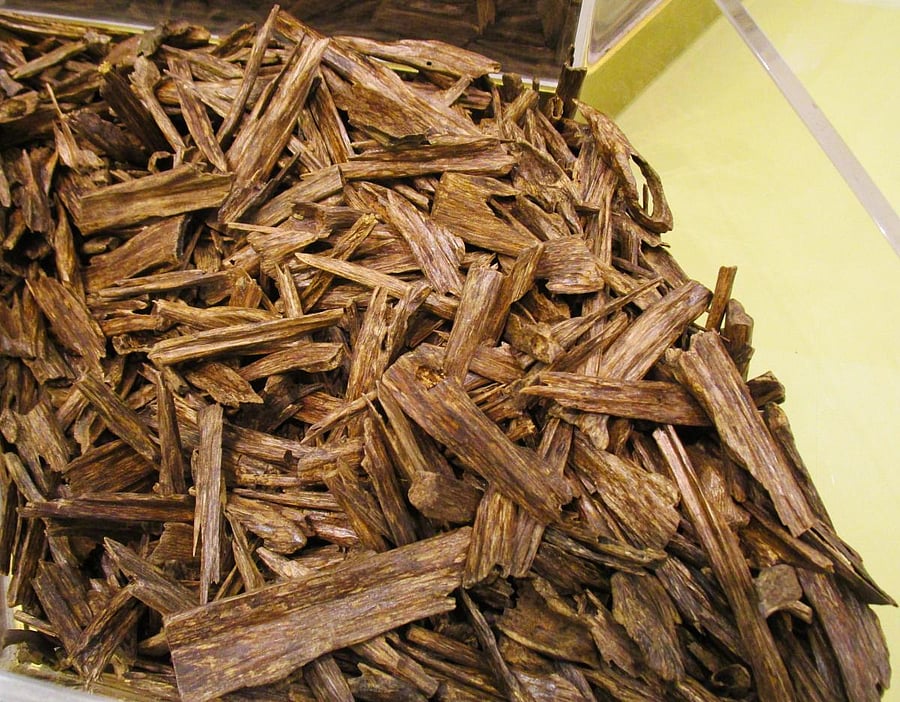
The familiar whiff captivates your senses and brings about instant calm.
The din and commotion of the ‘South Bombay’ peak hour seems to dissolve in the aromas of that mystical smoke rising from a quaint metal incense burner.
A kind old gent in a maroon skull cap and pristine white sadra vest takes it around his ancestral home to let the sweet, woody, resinous scent permeate through its large, antique windows.
Indeed, this is one of the many endearing nostalgias of Zoroastrian Mumbai that still retains its heart-warming charm — old Parsi homes synonymous with their evening Loban ritual which has a deeper meaning than what meets the nose. An ancient religious practice, burning Kodiya Loban, Gujarati for benzoin, imported from South East Asian countries, blesses the tiny community with more than its deeply spiritual aromas.
It is known to disinfect the space and keep bacteria and viruses away.
incense. PHOTOS BY AUTHOR
Benzoin blessings
In regions as far as the Maghreb in North Africa where it’s called Bakhour Jaawi (Javanese incense) known to drive away the evil eye, this blissful benzoin resin derived from the styrax trees species even yields a medicinal tincture. With the coronavirus terrorising the world, mankind is on edge, finding ways and means to protect itself through cleanliness and other forms of prevention. Though they don’t necessarily guarantee protection from this particular lethal virus, certain resins, when burnt over charcoal, are known to purify the space, freeing it from germs, insects and bacteria. Burning them as incense has been a part of many cultures the world over.
India has been a treasure house of exotic resins since ancient times. “Like the tradition of havan kept away germs through the centuries with the healing ingredients offered to the sacred fire, burning benzoin or agarbatti is today a mini form of havan and performs nearly the same function,” explains senior traditional perfumer Krishan Mohan Singh.
His rare Triple A-Grade benzoin with its sharp pungent, sweet aroma is much sought after for the shuddhikaran (purification) of homes, office spaces and places of worship. While the captivating scent of benzoin also fills Indian churches after mass, famed kathakaar Morari Bapu believes that fragrant resins are a form of shree considering their positivity and health benefits. Guggul or camiphora mukul, synonymous with the Indian subcontinent, thanks to its antimicrobial and anti-fungal properties, cleanses the air. Camphor sales too, have shot up since the coronavirus threat.
Frankincense
Resins, extracted from the barks of varied tree species, come in different forms, among the oldest being frankincense. Known as one of the gifts the wise men offered the newborn Jesus along with gold and myrrh, another sublime resin, frankincense finds a lofty pedestal in the Bible.
Oman is known as Al Ard Al Lubaan, Arabic for ‘the land of frankincense’. The sultanate’s legendary ‘Boswellia’ trees of the Dhofar region produce the world’s finest frankincense. Fresh, citrus, warm, aromatic and resinous, much like a warm glass of orange juice, Oman’s different varieties of frankincense instantly calm the spirit. Burning a few pieces on charcoal or on an electric incense burner fills the space with positivity instantly.
Jerfi Jamil of J’s Frankincense and Myrrh is one of Oman’s largest producers and experts of the resin. He believes that frankincense and myrrh kill bacteria or any microorganisms including viruses as was proven by the ancient Egyptians. “Research about mummification by the ancient Egyptians reveals that the use of frankincense and myrrh oils was not just for the pleasant scent but to delay the decay process,” he explains. India too has its variety of frankincense. Known as bili dhoopa (white incense) in Kannada and khada dhoop in Maharashtra, spice markets and incense shops in major Indian cities and towns sell it for reasonable prices. The quality however, must be scrutinised before purchase.
Agar antivirus
The king of all resins is agar. Also called agarwood or oud, Vedic sciences have advocated its myriad health benefits long before the Arabs obsessed over its unique scent. The forests of Assam are known to house the richest reserves of the aquilaria trees. These, when infected, yield a resinous, fragrant hardwood which is extracted.
While a part of it is used as incense, some of it is distilled to derive the world famous Dehn Al Oud oil extract. “Agarwood dust and chips are antibacterial and burning them drives away mosquitoes, thanks to the presence of phenol also present in the oil,” says Tajul Islam Bakshi of Assam Aromas, one of India’s renowned oud distillers. Agarbattis were originally made of pure agarwood, now a near-to-extinct practice. Burning them was not just a religious ritual, he believes, but also a way to purify the atmosphere.